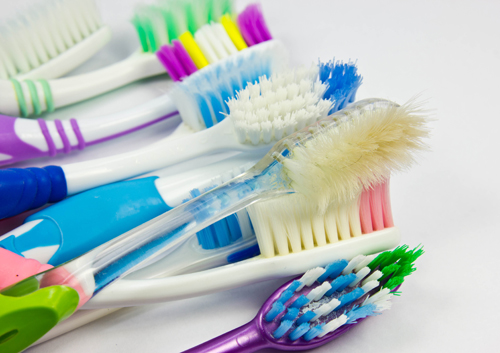May 31st, 2017

Dr. Timm will tell you that while you are sleep, your mouth may be very active. If you find yourself waking up with headaches, facial pain, neck aches, or a sore jaw, you may have tooth grinding, a condition we also call bruxism.
We see many people who experience some extent of tooth grinding, but a very small percentage of the population actually experiences symptoms severe enough to warrant visiting a doctor. If you continually experience any of the symptoms listed above, we encourage you to give us a call at our Michigan Center, MI office so that we may be able to diagnose and treat the problem.
The most common treatments include:
- Reducing your stress level to help relax your jaw muscles and prevent grinding
- A custom-made night guard to cushion your teeth and protect them from damage
- Changing your eating habits. Coffee, tea, or alcohol before bed can increase your chance of nightly grinding
- If your jaw or teeth are misaligned, Dr. Timm may also recommend a brace to decrease grinding.
Grinding your teeth can have serious consequences that, if left untreated, can lead to tooth fractures and damage to the TMJ (temporomandibular joint).
If you think your teeth may not be getting the rest they need at night, we encourage you to give us a call and schedule an appointment with Dr. Timm. Call us today!
May 24th, 2017

If you're considering getting an implant, you'll most certainly have questions for Dr. Timm. You might be wondering how a dental implant compares to a real tooth. Let's look at some of the differences between implants and natural teeth.
It should be noted that one of the primary goals of implant dentistry is to try to provide the same form and function as your natural teeth. However, with that in mind, know that an implant is not a tooth. An implant does not decay and does not have dental pulp or periodontal membrane like teeth.
An implant won't always work in every case, but they do have some great advantages when they are called for. Some advantages of an implant:
- Often last for decades without needing to be replaced
- Create a functional and aesthetically pleasing replacement for your missing tooth
- Don't require surrounding teeth for support
- Do not decay like natural teeth
- Can be fixed or removable
- Are able to replace single tooth or multiple teeth
There are downsides to implants where natural teeth win out. The disadvantages of implants include:
- Higher cost compared to traditional dentistry
- It's a surgical procedure which requires a period of healing afterward
- Fracturing of fixtures and loosening of screws can occur (only in about 5% of patients)
- Since there is no cushion between the implant and the bone, fracturing of crowns and bridges is more common with implants than with natural teeth, though this is rare.
It's best to speak with Dr. Timm about your options regarding implants. Let us know what you want to achieve and we'll work with you as best we can to accomplish that. And don't hesitate to contact our Michigan Center, MI office for further questions about the procedure.
May 17th, 2017

While there is no definite evidence that if your prevent gum diseases, like periodontitis, that you may be able to prevent a heart condition or heart disease. The only thing experts, like Dr. Timm, know for sure is that if you take care of your gums it can lessen atherosclerosis, (build-up of artery clogging plaque) that may result in a heart attack or stroke.
Could periodontal disease cause heart attacks?
Regardless of your oral health, if you're at a high risk for heart disease, you need to take action.
- Maintain a healthy weight or lose weight.
- Consume healthy foods and beverages.
- Exercise several days the week. Walking is a powerful and lightweight exercise and will clear your head while helping your body get or stay healthy.
- Control any medical conditions you may have such as high cholesterol, diabetes, or high blood pressure.
- Reduce your stress. Have lunch with a friend, go for a walk in the park, take a bubble bath, mediate, or do whatever you find relaxing.
- Get a social life. Laughing reduces stress and “feel good” hormones. Everyone needs to feel like they are a part of something: join a book club or any activity where you can interact with other people at least once or twice a week
- Be sure to get enough sleep. The recommended amount is eight to nine hours a night. It has been proven that a lack of sleep increases your risk for angina, strokes, and heart attacks.
- Practice good oral hygiene to keep bacteria in check and your mouth healthy.
Contact our Michigan Center, MI office if you have questions about your heart and oral health. If you take practice good oral hygiene, both your mouth and your heart will thank you.
May 10th, 2017

Dr. Timm and our staff recommend that you replace your worn-out, germy toothbrush with a new one every three months. But most people either forget or resist getting rid of something that is still “working.”
Maybe if they had a few ideas for putting that old toothbrush to good use, more people would take our advice? To encourage good oral practices, we offer these ten fun things you can do with your used toothbrush:
1. Let your five-year-old budding Da Vinci create a masterpiece with some paint and your old toothbrush.
2. Scrub oily areas on your face with your toothbrush. The bristles are perfect for removing embedded dirt and oil that clogs pores.
3. Pamper your hamster by brushing his fur with an old toothbrush.
4. Dab a bit of Vaseline on the bristles and comb your eyelashes: instant glamour! Got dry, flaky lips? Slough away by using a toothbrush on your lips.
5. Remove the bristles: instant small plant stakes!
6. Old toothbrushes are great for spot-cleaning just about anything.
7. When nobody is around to scratch an unreachable itch on your back, turn that old toothbrush into your personal backscratcher.
8. Is your dog’s breath so bad that all your houseplants have died? Try brushing his teeth with your old toothbrush so that his kisses (and breath) are more tolerable.
9. Give your fish the cleanest tank in the neighborhood by scrubbing it with your old toothbrush.
10. Did you notice a few gray hairs sprouting from your hairline this morning? Old toothbrushes were made for touch-up dye jobs; works for dyeing your eyebrows, too!




